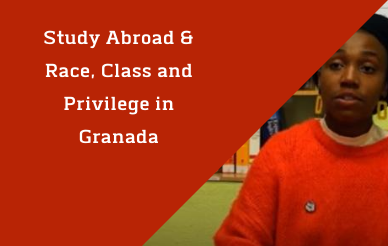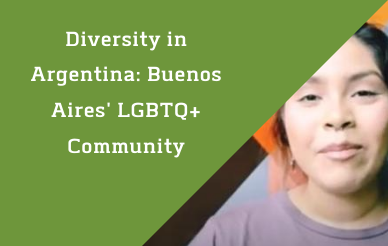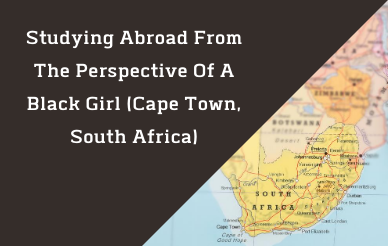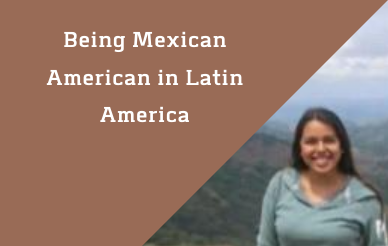Diversity & Identity
All students are welcome to study abroad!
Here are some resources for diverse Tritons venturing abroad:
Study Abroad, UC San Diego is committed to helping advance and promote the participation of a diverse student body in all of its international programs. We believe that the joy and life-long impact that a study abroad program can have on an individual is an experience that should be accessible to all regardless of race, ethnicity, religion, sexuality, gender, disability, economic background etc. To advance this endeavor, Study Abroad, UC San Diego will act as a resource and support center for interested students who seek advice and guidance as they embark on their journey of self discovery. We are in the business of empowering students by informing them of the boundless opportunities available to them.
All programs and initiatives coordinated by Study Abroad UC San Diego are designed and implemented in full compliance with Proposition 209 and the University of California Anti-Discrimination Policy.
Explore Your Identity Abroad
Students of color abroad
Study Abroad UC San Diego is committed to promoting access to study abroad for students of color, and offers the following resources that will help make study abroad safe, empowering, and fun for students of all backgrounds.
Here are some questions to ask yourself if you are a student of color:
How will my ethnicity and skin color be perceived in my host country? What kinds of ethnic stereotypes are there in the country?
How should I react if I experience something that I find offensive?
Is the person just curious... or do they have bad intentions?
If I'll be staying with a host family, will they have hosted minority students before? Will my ethnicity be an issue for them?
Am I used to being a part of the majority at home but will be a minority abroad? Vice versa?
Will there be other minority students in my program, or a community there that can support me?
Who can I contact if I do face racial or discriminatory incidents during my program?
Does my program have support staff that will understand and help me through racial/discriminatory incidents that I may face?
Here are some tips for students of color to consider:
First and foremost, while you may face some uncomfortable situations abroad, always remember to put your safety first.
Remember that people abroad have different cultural norms and tend to be less “politically correct” than people in the U.S.
The more you integrate with the culture the less you'll stand out, but your skin, hair, or other features may still attract attention.
Research what kinds of contact and relations your minority group has had in your host country. You may also want to research immigration in general.
Be aware that people may generalize or incorrectly identify your ethnicity.
Learn more about other minority students’ experiences abroad. For example, you can talk to other minority students who have studied abroad or find information online.
Build a support network among other study abroad students so that if you do face racial or discriminatory incidents you'll have support to deal with it.
Be prepared if an incident does arise, but don't go abroad expecting racism or discrimination.
Here are some online resources to check out:
AllAbroad.us- Advice for African-American Students
- Advice for Asian/Pacific Islander Students
- Advice for Latinx/Chicanx Students
- Advice for Native American Students
- Underrepresented Students
- African-American Students
- Asian/Pacific Islander Students
- Latinx/Chicanx Students
- Native American Students
LGBTQIA+ students abroad
Study Abroad UC San Diego is committed to promoting access to study abroad for LGBTQIA+ students, and offers the following resources that will help make study abroad safe, empowering, and fun for LGBTQIA+-identified students.
First, review our interactive LGBTQIA+ Info Flyer
Here are some questions to ask yourself if you are a LGBTQIA+ identified student:
What are the laws regarding homosexuality and gender identity in my host country?
Is it safe for me to be out when I’m abroad? Should I come out to my host family?
What are the cultural norms for dating and friendship?
What kinds of LGBTQIA+ resources are there in my host country?
What is the LGBTQIA+ population like in my host country? How visible and large is it? How do they dress, behave, etc.?
Here are some tips for LGBTQIA+ students to consider:
First and foremost, always put your safety first.
Before you leave, familiarize yourself with the customs and laws of your host country.
Research whether or not talking about sexuality is taboo.
Research the terms and definitions used in your host country to talk about LGBTQ+ issues.
Find a support network abroad.
Here are some online resources to check out:
Terms and Definitions: UC Davis' LGBTQIA+ Resource Center Glossary
Travel Resources
- International Gay and Lesbian Travel Association
- Out Traveler
- Purple Roofs
- Study Abroad Guide for LGBT Students (PDF)
Organizations
- International Lesbian and Gay Association – ILGA
- International Lesbian and Gay Human Rights Commission – IGLHRC
Scholarships
Studying Abroad as a Transgender Student
Transgender students are valued members of the University of California, San Diego communities. While studying abroad at other campuses, the values and cultures regarding transgender students may not be the same as at UC San Diego. In order to provide support for the needs of incoming and current transgender students currently or planning to study abroad, we strongly encourage students to contact their study abroad advisor. For more information regarding transgender living concerns and the transgender community studying abroad from UCSD, please go to http://lgbt.ucsd.edu.
International Legal Issues
Domestic Legal Issues
Heritage-seeking students abroad
For many ethnic minority students, learning about their heritage is very important. Going abroad presents these students with an opportunity to connect and learn about their ancestral history and culture firsthand. These students may pursue study abroad in the country where their families come from “not because it is unfamiliar and new, but rather because it is somewhat familiar."
Here are some questions to ask yourself if you are a heritage-seeking student:
How will I be perceived in my home country?
Will I be accepted in my home country?
How should I react if I find something to be offensive?
Am I used to being part of the minority at home? How will it be to be a part of the majority abroad?
Will there be other heritage students in my program?
Here are some tips for heritage-seeking students to consider:
Remember although there is an ethnic affiliation between you and the people in your home country, there are many cultural differences and you might not be accepted as one of their own.
Dressing and acting like the locals can make you stand out less.
Research the customs and culture of your home country. There might be great differences between what you think you know about the home country based on how you were raised and what it is actually like.
Be aware that people may generalize or incorrectly identify your ethnicity.
Learn more about other heritage students’ experiences abroad. For example, you can talk to other heritage students who have studied abroad or find information online.Students with disabilities abroad
Study Abroad UC San Diego is committed to promoting access to study abroad for students with disabilities, and offers the following resources that will help make study abroad safe, empowering, fun, and accessible for all students.
Here are some questions to ask yourself if you are a student with disabilities:
How are people with my disability viewed abroad?
How should I respond if people give me unsolicited help?
If my disability is invisible, am I willing to share it with my peers or host familty?
How accessible are places in my host country?
Will my disability prevent me from participating in certain excursions because of inaccessibility?
What resources and accommodations do I need to participate in my academics abroad?
Here are some tips for students with disabilities to consider:
Talk with other students with disabilities and learn about their experiences abroad.
Let your counselor or program director know about your disability, if you are comfortable doing so, so that as many accommodations as possible can be made.
Keep in mind that places abroad may not be as accessible as you are used to.
Remember that people with disabilities may be treated differently than you are accustomed to.
Research before you go so you have some idea of what to expect.
Be flexible and think creatively about how you can accommodate your disability abroad.
Here are some online resources to check out:
DACA and undocumented students abroad
DACA and undocumented students are advised to work with the Office for Undocumented Students Services and Study Abroad to obtain the most updated information on how their status may affect their plans to study abroad. There are options to study away within the U.S.that DACA and undocumented students may wish to consider.
UC San Diego Undocumented Student Services: (858) 822-6916
Advising Resource:
Are you an undocument student with DACA who is considering studying abroad? Currently, only undocumented students with DACA may apply for Advance Parole to study abroad. Be sure to book an appointment with the UC Immigrant Legal Services Center attorney, Andrés Lemons to discuss if traveling is safe for you.
Important:
Students with DACA who would like to study abroad are highly encouraged to prepare a minimum of 10-12 months before their trip abroad as applying for Advance Parole takes a minimum of six months.
Other University of California Undocumented Student Resources:
Undocumented Student Program – UC Berkeley
UCI Dreamers – UC Irvine
Services for Undocumented Students – UC Merced
Undocumented Student Programs – UC Riverside
Undocumented Student Support Services – UC San Francisco
Dream Scholars / Undocumented Students Services – UC Santa Barbara
Undocumented Student Services – UC Santa Cruz
International students abroad
Are you an international student who is considering study abroad? Be sure to check out the International Students and Study Abroad information page:
International Students and Study Abroad
*Important: International students in F and J visa status are encouraged to start preparing early if they are interested in studying abroad while at UC San Diego. It is recommended that you begin researching and applying for study abroad opportunities at least one year prior to your expected study abroad start date. Click on the link above to review all steps to understanding how studying abroad may affect your status.
Transfer students abroad
Study Abroad UC San Diego is committed to promoting access to Study Abroad for Transfer and Reentry students. Study Abroad can be a great way to explore your passions, advance your academic and personal plans, and enhance your resume and global credentials.
Check out our Transfers Abroad resource page!
Engineering students abroad
Do you identify as an Engineering student or a student in a STEM discipline? Check out our guide to Study Abroad in Engineering resource page!
Gender abroad
Being a woman studying abroad can be an eye-opening experience, because every culture has different attitudes towards women. Try to find out about your host country’s cultural values and behaviors regarding women both before and during your trip.
Here are some questions to ask yourself if you are a woman studying abroad:
What are the societal and cultural views of gender in the host country abroad? How does this impact the way in which women exist in society? How does this impact your decision to study abroad?
Are there societal and cultural ways in which women are supposed to behave, express themselves, and relate?
Are there safety and security concerns for women traveling alone or in a group? How does this differ to your current practices at home? Might this limit or change when and how you go out such as at night or in particular locations?
What are the cultural norms regarding friendship and dating?
Do people in my host country have stereotypes of American women?
Things to consider:
Do research on gender roles and their history beforehand.
Put your safety first and be aware of your surroundings.
Dress and act like the local women to avoid standing out.
Be aware of cultural differences, including body language, that may be misinterpreted in your host culture.
Talk with other women who have studied abroad to find out more about their experiences.
Here is an online resource to check out:
Women Travelers (U.S. State Dept.)
Why is overseas study so unappealing to male students in the US?Age diversity abroad
While colleges and universities may traditionally serve a particular age group (18 - 26-year-old students), we recognize and value supporting our students who are older. We offer the following resources that will help make study abroad safe, empowering, fun, and accessible.
Here are some questions to ask yourself if you are an older student studying abroad:
Do I have work, home, and/or family obligations that prevent me from studying abroad for an extended period of time?
Will there be other adult students in my program?
How old are the other students participating in my program?
How do people in my host country view adult students?
What skills do I want to gain or improve while I’m abroad?
Here are some tips for older students to consider:
Look into short term programs if you cannot afford to spend an extended period of time away from your family and can’t take too much time off work.
Talk with other adult students who have studied abroad.
Sometimes you might feel that you don’t fit in, but remember not to isolate yourself from the rest of the group. Get to know the others and let them get to know you.
Research what people close to you age in the country you will be studying in and the areas they may live. For example, do they work? Take care of their children and/or parents? Live alone or with extended family?
Religion and spirituality abroad
Religion plays a role in many cultures around the world. If you are planning to practice your religion abroad, ask locals or your program staff to see if there are any places where you can worship safely. Even if you don't practice a religion yourself, many on your program may. It can be helpful to find ways to support your peers, and to understand how to be an ally for them while you're abroad. You’ll also want to find out what degree of religious tolerance there is in your host country.
Here are some questions to ask about religion and studying abroad:
What is the dominant religion in my host country?
Will I be part of the religious majority or minority abroad?
Are there any laws regarding religion? Is there a separation between religion and government?
How tolerant is the host country of other religions? What about atheists and agnostics?
Is it safe for me to wear religious symbols or clothing?
What are ways I can respect the religion in my host country and participate in cultural events, even if I don't practice that religion?
Here are some tips about religion:
Stay open minded about religious practices, even if you receive criticism for your beliefs.
If you are planning to practice your religion abroad, you may want to find out what places of worship there are.
If you have religious dietary restrictions, be sure to let your program director or appropriate staff know ahead of time, especially if you are living with a host family.
Depending on where you go, religion may have a larger or smaller role than it does in the U.S.
Use your experience abroad to learn about world religions and the role they play in diverse cultures.
Active allyship abroad
It is important to recognize that your privilege may make your experiences different from your fellow students or locals while you are abroad. If you want to support others whose identities are marginalized at home or abroad, remember that being an ally requires educating yourself and action. If appropriate, speak up to people who share your privilege if they are being insensitive.
Here are Some Questions to Ask Yourself if You Seek to Practice Active Allyship:
- Who am I? What identities do I hold? Have any of these changed over the course of my lifetime?
- Which of my identities are most salient for me in my daily life?
- What privileges have allowed me to be where I currently am in the world? Some examples may be my educational background, passport, or native language.
- How might local students and community members view me? Are there ways in which my interactions in a new country might advance my privilege? How do I feel about this?
- How might other students on the same abroad program be experiencing life differently?
- What issues or problems might other students face that I haven’t thought about or noticed because of my privilege?
- How would I react if someone on my program or in my host country was sexist, racist, homophobic, or otherwise discriminatory?
- How can I be inclusive and supportive of others who do not share the same privileges as you?
Check out:
UC San Diego Campus Resources
UC San Diego Campus Resources
- Office for Equity, Diversity, and Inclusion
- Undocumented Student Services: (858) 822-6916
- Black Resource Center: (858) 534-0471
- Cross Cultural Center: (858) 534-9689
- LGBT Resource Center (in Old Student Center): (858) 822-3493
- OASIS: (858) 534-3760
- Chancellor’s Associates Scholars Program (CASP) (858) 534-8366
- Student Success Coaching program
- Office for Students with Disabilities (OSD): (858) 534-4382
- Raza Resource Center: (858) 822-0072
- Asian Pacific Islander Middle Eastern Desi American (APIMEDA) (858) 822-0525
- Intertribal Resource Center (ITRC) (858) 822-0048
- Women’s Center: (858) 534-0074
- Veteran’s Affairs: (858) 534-5080
- IDEA Engineering Student Center
- Teaching + Learning and Commons
Articles and Links
- My Study Abroad Adventures in Barcelona, Spain as an Asian American
- Travel as Black Joy: Tripadvisor's Black History Month 2021
- Being Chicana in Europe
- “Negra Soy”: Why I’ve Moved Away From The Term Afro-Latina
- My Very Personal Taste of Racism Abroad
- Meaningful Travel Tips and Tales: Latinx Traveler Perspectives
- Traveling While Black
- Dreaming in French: On Angela Davis
- What’s keeping black students from studying abroad?
- Asian American Students in Global Education
- Amnesty International – USA
- New Internationalist
UCEAP programs with higher-than-average First Generation student participation rates
Being Me Abroad | Natural Hair Care
IES Abroad staff share their natural hair routines while abroad.
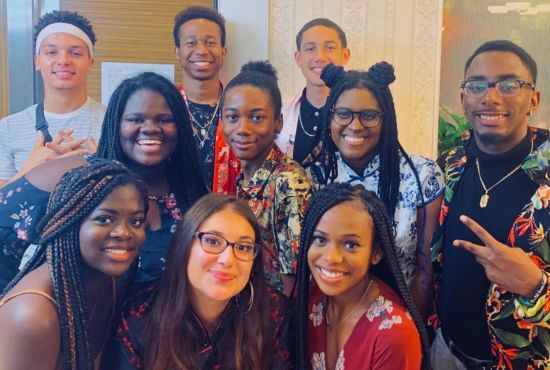
3 Tips for First Gen Students
Planning Tip #1: Get Advised
Use your resources! Meet with study abroad advisors, academic advisors, and financial aid advisors regularly - they will help guide you through the process. Talk to students who've already studied abroad to get firsthand advice. Don't know anyone? Study Abroad will connect you with returnees.
Planning Tip #2: Do Your Research
Plan time in your schedule to really research study abroad. Bookmark important sites. Learn all of your options to make the best decisions for choosing a program and to prepare for success abroad.
Planning Tip #3: Find Support
Deciding to go abroad, especially if no one you know before you has done it, can be daunting. Some family and friends may not understand your motivations, but it's important to find people in your life who will support your decision and who can help you ease into a study abroad program more smoothly.

Study Abroad in Ghana
Watch UC San Diego's International Relations Major Fabiola discuss her amazing experiences studying abroad in Ghana!
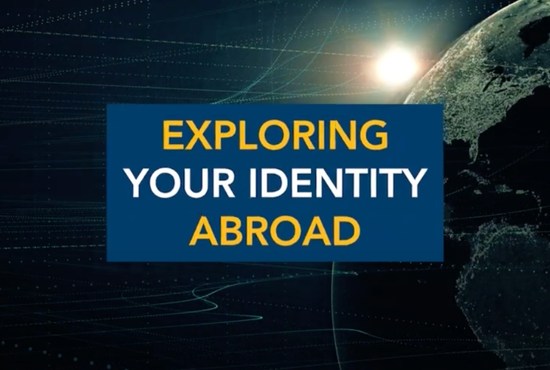
Exploring Your Identity Abroad
Join this collaborative series between all the UC campuses and UCEAP that provides identity-based study abroad workshops, panels, and information sessions for students across the University of California system. Click the link for session topics and to learn more!
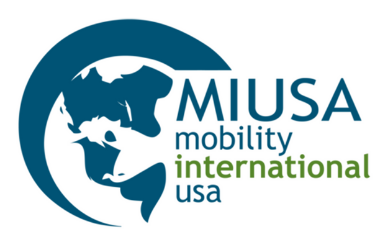
Travelers with disabilities explore identity and diversity through international exchange
Mobility International's Intersections Abroad offers stories of travelers with disabilities exploring identity and diversity through international exchange.
Diversity resource pages from UC campus study abroad offices
Diversity resource pages from study abroad providers
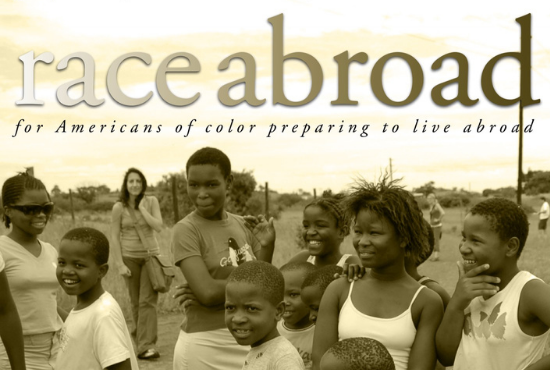
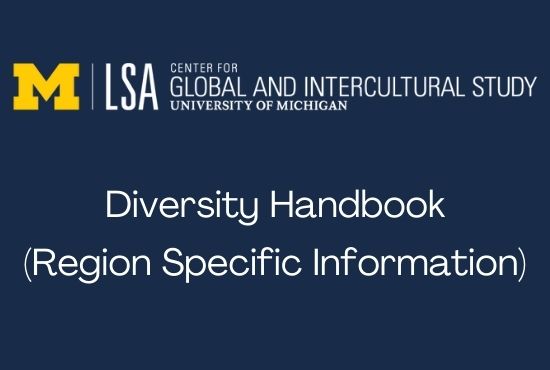
A Regional Specific Diversity Handbook
The Center for Global and Intercultural Study (CGIS) offers a regionally specific Diversity Handbook with insightful and honest identity-based information and quotes.

Amanda Gorman on the Power of Study Abroad
National Youth Poet Laureate and IES Abroad Madrid Alum Amanda Gorman exemplifies the poetry and power of study abroad.
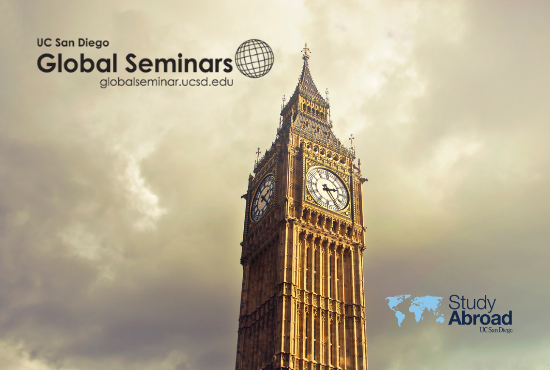
Global Seminars Blog
Read all about amazing and engaging experiences from UC San Diego Tritons participating on Global Seminars all over the world!
UCEAP Blog
Check out UCEAP's Blog 'The Californian Abroad', the "go-to hub for UC students who love to travel, connect with other cultures and inspire others to live life fully."
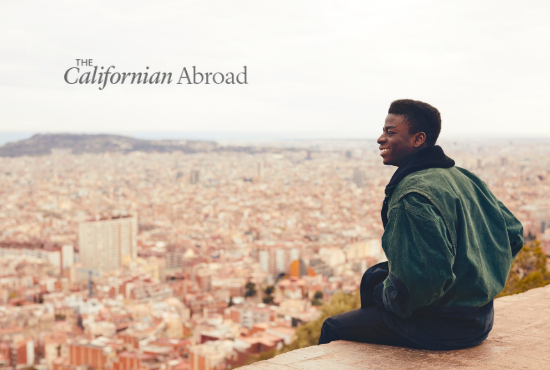
Why Should You Study Abroad?
"Studying abroad isn’t just a fun way to spend a semester; it is quickly becoming the key to success in our global economy... It’s also about having real experience with the world beyond your borders – experience with languages, cultures and societies very different from your own." — Michelle Obama




